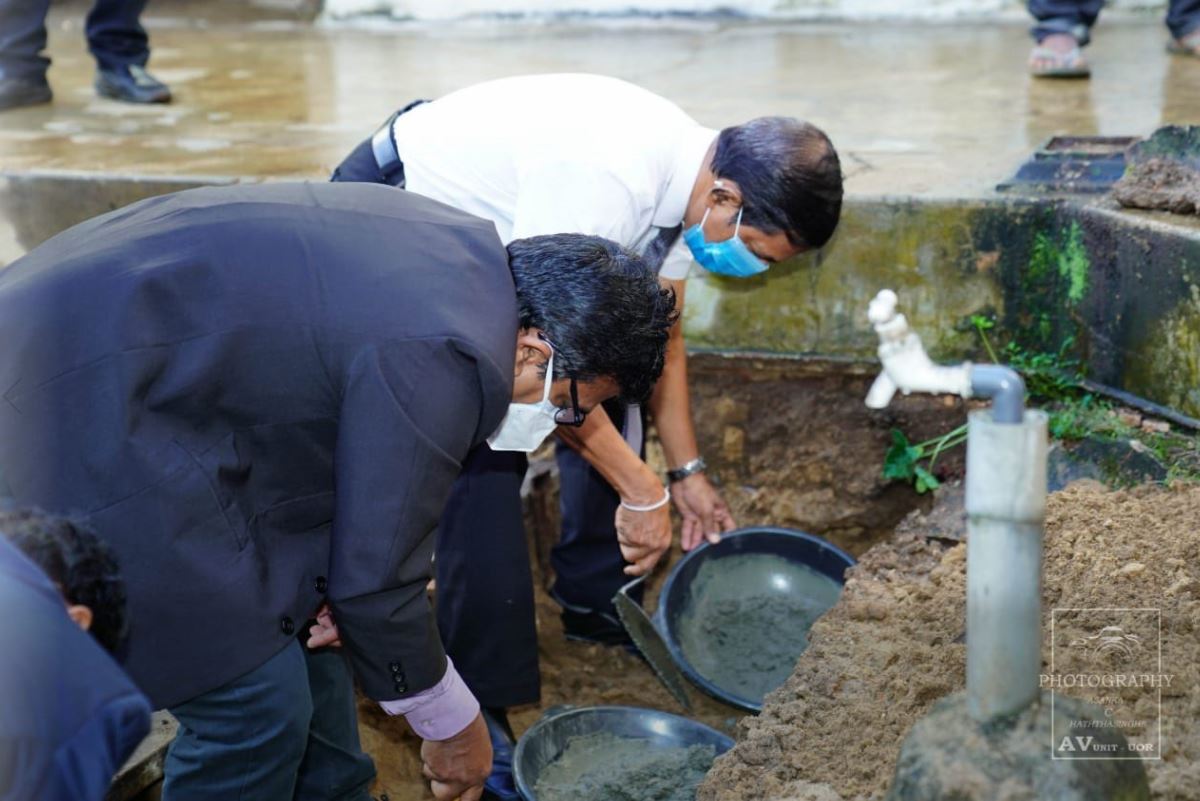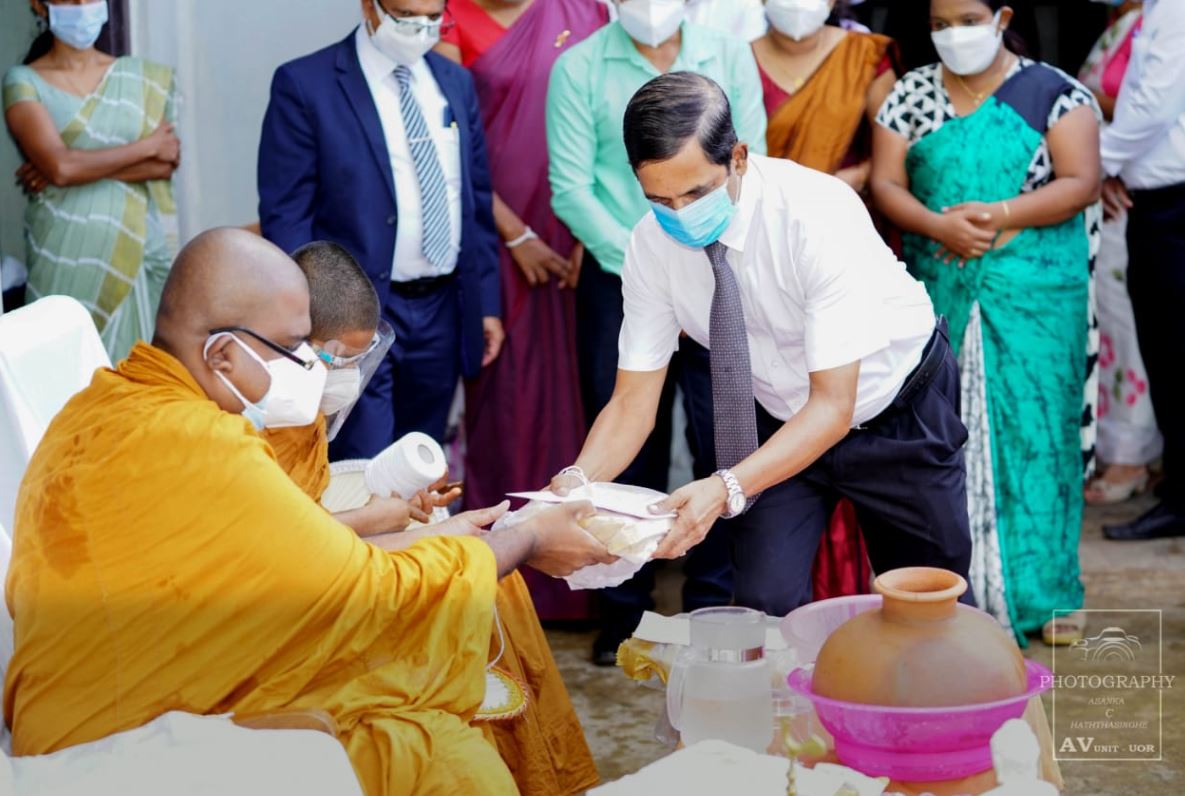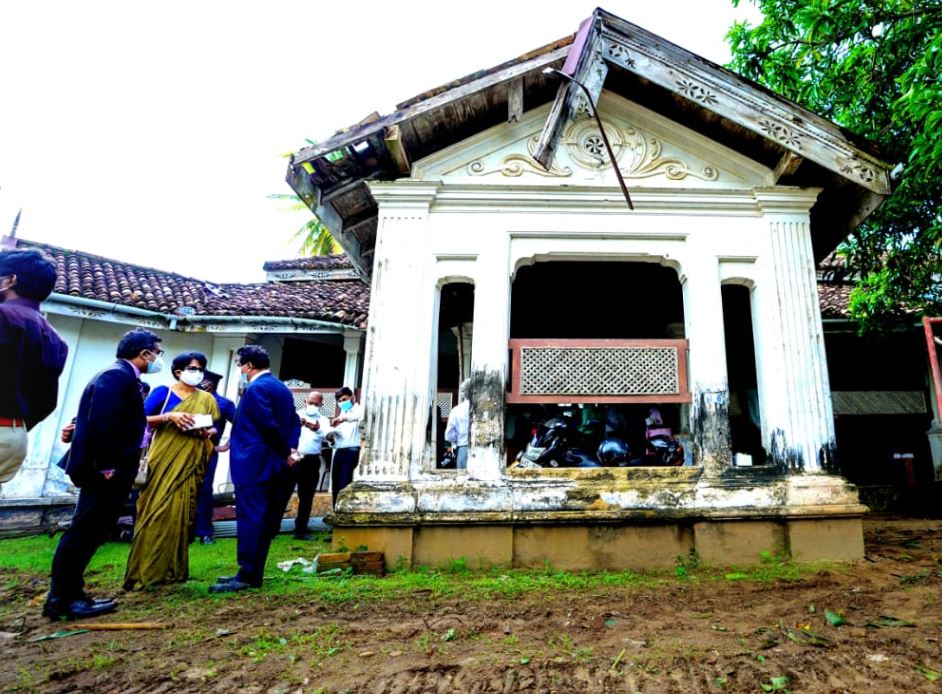Foundation Stone Laying Ceremony, Faculty of Graduate Studies
- webmaster
- News
- Hits: 2693
Foundation Stone Laying Ceremony for the new Building Complex, Faculty of Graduate Studies
University of Ruhuna
 |
 |
 |
 |
 |
 |
 |
 |
Foundation Stone Laying Ceremony for the new Building Complex, Faculty of Graduate Studies
University of Ruhuna
 |
 |
 |
 |
 |
 |
 |
 |
First Staff Induction Training Program of the University of Ruhuna
Date: 04th -15th October 2021
Venue: Auditorium Faculty of Humanities and Social Sciences
Staff Development Center recently conducted the First Staff Induction Training Program of the University of Ruhuna successfully. The training program is a brainchild of Senior Professor Sujeewa Amarasena, the Vice Chancellor University of Ruhuna. This program was developed to train the 40 new management assistant and technical officer employees. The training program began with a charming inauguration and participants were advised to adhere strictly to all health guidelines.
This training focused on all related knowledge, skills and attitudes of an employee (Table 01). All sessions were facilitated by the University's academic and administrative staff. In addition, the Department of Computer Science, Department of English Language and the Carrier Guidance Unit have given their fullest cooperation and actively involved to improve the employees’ skills and attitudes towards the development of the institute and their carrier paths.
The first week of the program focused on improving knowledge about the administration of the university and developing positive attitudes. Training on ICT and English was given during the second week. Following the two weeks, participants were evaluated. The sessions were also reviewed through feedback from participants.
Upon completion, a certificate was awarded at the closing ceremony where vice chancellor was invited as the chief guest.
Table 01: Titles of the Training Sessions
|
Developing Positive Attitudes at the Work
|
||
|
Session |
Session Title |
|
|
- Work Ethics Values, Behaviors, Culture and Attitudes - Accountability in the work place - Understanding Employee Discipline and Leadership - Build an Eco-conscious workplace - “How to build and maintain happiness, Self-Motivation, Attitudes for Productivity, Quality and Safety Improvement’ (Recording) |
||
|
Increase awareness and knowledge on various functions of the divisions/departments/faculties
|
||
|
Session |
Session Title |
|
|
|
- Works Functions and Work Procedures |
|
|
|
- Introduction of Financial Regulations into work Procedures of the University system - Payment procedures and practices of the University (Special attention to the F.R 1992) - Payment of Personal Emoluments of University (Attention to the F.R/UGC /MOHE Guide Line etc.) - Introduction of General Procurement Procedures of the University System - Introduction of Accounting practices and principles of the University (SLPSAS/SLAS)
|
|
|
- Institutional Legal procedures |
||
|
- Introduction of Internal Audit Practices and Audit Functions |
||
|
- Sexual and Gender based Violence - Occupational health and Safety |
||
|
Skill development in Information and Communication Technologies
|
||
|
Session |
Session Title |
|
|
- Office Applications: MS Word - Office Applications: MS Excel - Introduction to Network - Introduction to Internet and Email |
||
|
Sessions on Skill development in English Language |
||
|
Session |
Session Title |
|
|
- Basic Communication Skills (Part I): Introduction to reading, writing, listening, and speaking skills, introducing oneself and getting to know each other - Reading and Writing Skills (Part I): Basics of writing, preparation of invitation and letters, Memo writing - Basic Communication Skills (Part II): Public relations, Telephone conversations and dialogues - Reading and Writing Skills (Part II): E-communication, Notices, Preparation of minutes |
||
|
Career Development |
||
|
Session |
Session Title |
|
|
- Work Life Balance” - Identifying areas for Personal Development” - Career Plan Development |
||
 Click to open image!
Click to open image!
Click to open image!
Click to open image!
 Click to open image!
Click to open image!
Click to open image!
Click to open image!
 Click to open image!
Click to open image!
Click to open image!
Click to open image!
 Click to open image!
Click to open image!
Click to open image!
Click to open image!
 Click to open image!
Click to open image!
Click to open image!
Click to open image!
 Click to open image!
Click to open image!
Click to open image!
Click to open image!
COVID-19 Management Centre Faculty of Medicine University of Ruhuna
A Centre for management of patients with COVID 19 is established in the Faculty of Medicine University of Ruhuna. This Centre is started with the collaboration of the National Operations Centre for Prevention of COVID 19 Outbreak (NOCPCO), University of Ruhuna and the Provincial Health authorities of the Ministry of Health. The Center will extend its services to the entire Southern Province. The Centre is established in the Faculty of Medicine under the guidance and the support given by the Vice Chancellor of the University of Ruhuna. The Centre is open for 24 hours and managed by the final year medical students on roster basis under direct supervision of the doctors of the Faculty of Medicine and the Teaching Hospital Karapitiya.
People can approach the Centre through SMS 1904 through out the day and will immediately contact by the team. After assessing the condition these patients are directed to home management or to a treatment Centre or hospital depending on the condition. If they need an ambulance for transport it will be arranged through the Centre.
In the SMS patients are expected to provide following information.
(A) Classification of Patients:
(B) Age (SPACE)
(C) NIC (SPACE)
(D) Address (SPACE)
 Click to open image!
Click to open image!
Click to open image!
Click to open image!
 Click to open image!
Click to open image!
Click to open image!
Click to open image!
 Click to open image!
Click to open image!
Click to open image!
Click to open image!
 Click to open image!
Click to open image!
Click to open image!
Click to open image!
 Click to open image!
Click to open image!
Click to open image!
Click to open image!
 Click to open image!
Click to open image!
Click to open image!
Click to open image!
 Click to open image!
Click to open image!
Click to open image!
Click to open image!
 Click to open image!
Click to open image!
Click to open image!
Click to open image!
 Click to open image!
Click to open image!
Click to open image!
Click to open image!
 Click to open image!
Click to open image!
Click to open image!
Click to open image!
 Click to open image!
Click to open image!
Click to open image!
Click to open image!
 Click to open image!
Click to open image!
Click to open image!
Click to open image!
Renovated Academic Establishment Branch
Vice Chancellor ceremonially opened the Renovated Academic Establishment Branch at the Administrative Building Complex.
 Click to open image!
Click to open image!
Click to open image!
Click to open image!
 Click to open image!
Click to open image!
Click to open image!
Click to open image!
 Click to open image!
Click to open image!
Click to open image!
Click to open image!
 Click to open image!
Click to open image!
Click to open image!
Click to open image!
Page 16 of 25